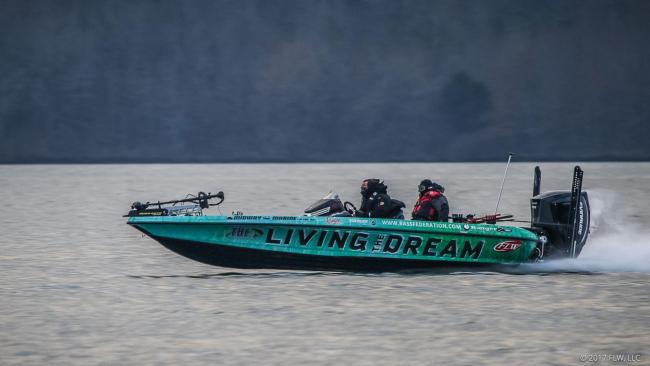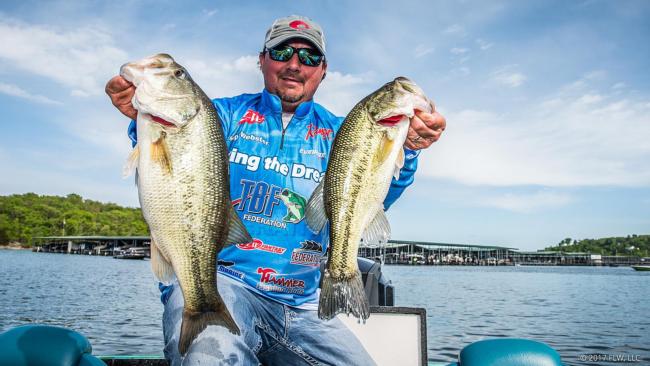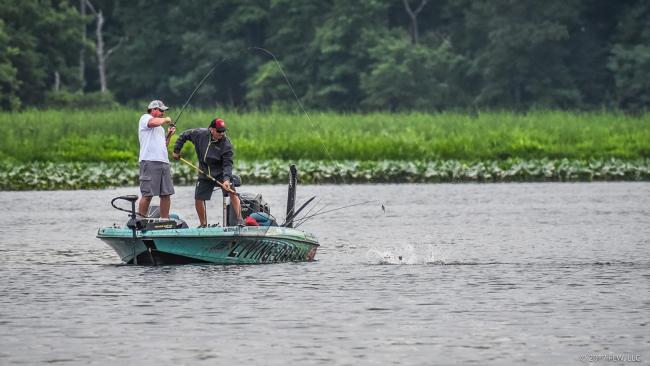Webster Ready to do What it Takes
Mississippi pro hopes a versatile skill set will turn out a strong Cup finish

Joseph Webster would be the first to admit that he’s not a specialist in any sort of fishing, though that isn’t necessarily a bad thing when you’re preparing to compete in the Forrest Wood Cup on Lake Murray.
The big South Carolina lake isn’t the type of fishery where specialists usually dominate. Instead, it’s one of those lakes where the angler who can do a number of things reasonably well has as much a chance of winning as the guy who focuses on one approach. Webster is the former sort of angler, a junk-fisherman – or “junker,” as he puts it – who can improvise when necessary to come up with a decent limit of bass.
The Mississippi pro proved that last year at Table Rock Lake when he won The Bass Federation National Championship and with it the “Living the Dream” package that included a spot in the 2016 Forrest Wood Cup and an expense-paid season on the 2017 FLW Tour. Webster made the most of both opportunities. In the Forrest Wood Cup, he finished 10th. In the ensuing Tour season, he placed 36th overall and earned another trip to the 2017 Cup.
This year in seven Tour events, Webster also collected five checks for $42,500, seed money for more tournaments. Though long on dreams, but short on the disposable income to pursue them, Webster hopes to do well enough at Lake Murray to convince some potential sponsors that he’s the real deal.
“It takes about $40,000 in entry fee money to fish the tournaments I want to fish, and I told my wife [Deah] that I wasn’t going to put it on a credit card,” notes the native Alabaman. “It won’t work unless I can pay my way.”
Webster, 42, is capable of doing well in this year’s edition of the Cup. In a 2009 TBF Southern Divisional test on Lake Murray, Webster paced the Alabama contingent with a three-day stringer that weighed 28 pounds, 9 ounces. It’s the only time he’s ever fished Murray, but, there again, the lake is just the sort of fishery that Webster prefers.
“Like a lot of others, I like tournaments that are tough – where you get one here and one there and really have to scratch it out to get a limit,” says Webster, who grew up in north Alabama and honed his fishing skills on such lakes as Lewis Smith. “I remember the [2009] Divisional was in June, and it was hot and there weren’t any easy fish. I caught some good fish on a [Zoom] Fluke when I saw them busting herring on main-lake points. Other guys caught ’em on Flukes and jigs and soft plastics for the most part. If you look at the results of just about any summer tournament on Murray, it would be pretty much the same thing.”
In a typical Murray tournament during the dog days of summer, the fish that make the biggest difference are the kickers that come from underneath docks or out of wood cover, or are caught while they’re chasing baitfish, including blueback herring and shad. The daily herring bite has pretty much run its course by midmorning, but cloud cover or lack of it sometimes factors in, and there are always those serendipitous moments when a school of bass suddenly pops up out of nowhere and starts chasing herring. Consequently, some anglers target offshore brush piles and docks in the vast midsection of the 50,000-acre lake while keeping their eyes peeled for schooling activity. Other fishermen key on the bank runners or dock fish up the feeder creeks. Webster doesn’t have any particular plan in mind, except that he’ll have to cobble together three limits from somewhere.
“I’m not banking on the herring bite lasting very long each day, but it’s sure worth checking,” advises Webster. “Really, flipping bushes way up the river [Saluda] worked for me best in the TBF tournament. From what I’ve heard, though, the cover up there has changed quite a bit because of the way they raise and lower the lake now. We’ll see. I’m going to work as hard as I can during the four practice days to come up with something.”
No pre-practice at the lake for him; because Webster is an insulation contractor who installs insulation in about 10 houses a week during the summer, he hasn’t been able to visit Murray or make assumptions about what to expect when opening morning of the Forrest Wood Cup dawns Aug. 11.
At least there’s a bit of an upside to that. Since he’s used to working in sultry attics all summer, Webster will be better able to handle what promises to be a hot tournament – in more ways than one.


